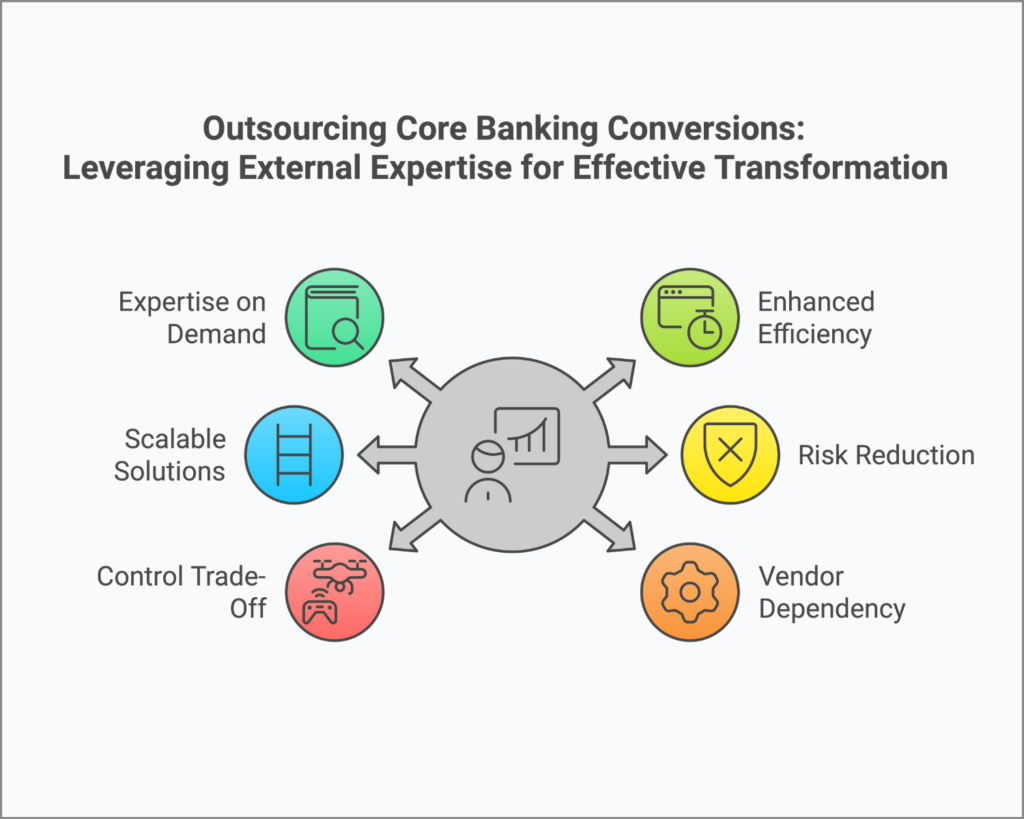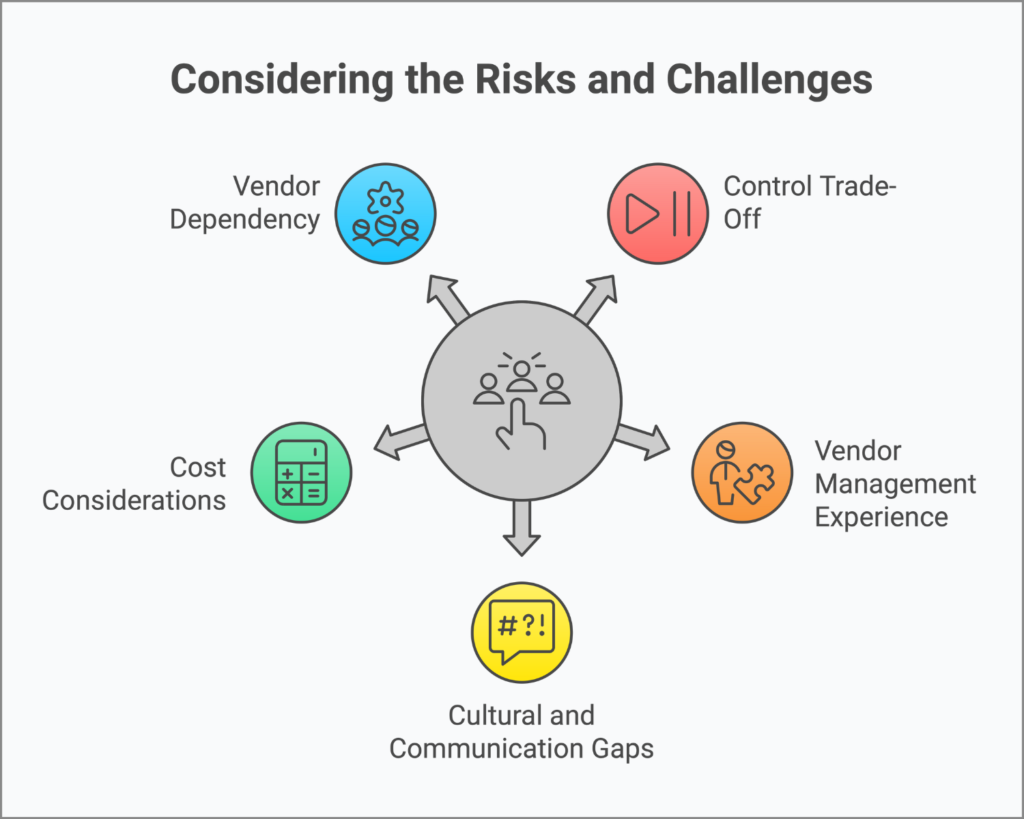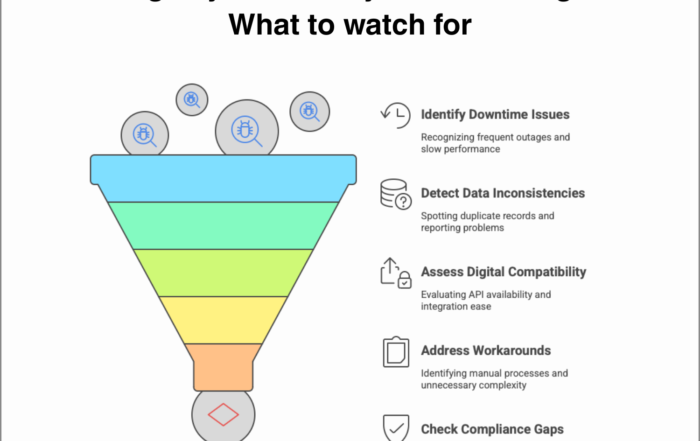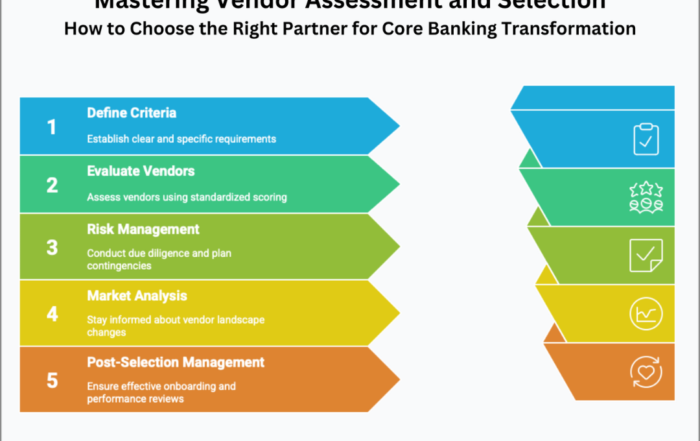
Exploring the balance of benefits and trade-offs in outsourcing core banking conversions for strategic transformation.
Have you ever felt like you were trying to navigate a ship through uncharted waters?
That’s how many banks think when faced with core banking transformations. To manage such a daunting task, outsourcing has become a go-to strategy for many institutions. This approach taps into specialized expertise to enhance efficiency and streamline the transition process. But is outsourcing the right choice for your bank? Let’s dive into why you might consider outsourcing your core banking conversion, its potential pitfalls, and how to decide if it aligns with your strategic goals.
Understanding Outsourcing in Core Banking Transformations
Outsourcing involves delegating the conversion process to external experts in core banking systems. These vendors bring a wealth of experience and resources, allowing banks to focus on their core business while the technical experts handle the transformation.
Why Opt for Outsourcing?
Expertise on Demand:
- External vendors are battle-tested in banking transformations, with insights and strategies honed across diverse projects. This expertise can be pivotal in navigating the complexities of a core system overhaul.
Enhanced Efficiency:
- With dedicated teams focused solely on your transformation, outsourcing can accelerate the process, helping you meet strategic timelines without the distractions of daily operations.
Scalable Solutions:
- Whether you’re a small bank or a global financial institution, outsourced vendors offer scalable services tailored to the size and scope of your transformation needs.
Risk Reduction:
- Experienced vendors utilize proven methodologies that minimize the risks associated with system conversions, offering peace of mind and reliability.

Considering the Risks and Challenges
Despite its benefits, outsourcing has its challenges. It’s crucial to consider these factors to ensure that outsourcing aligns with your bank’s long-term objectives:
- Control Trade-Off:
- Outsourcing can mean relinquishing direct control over specific processes, which might lead to challenges if the project scope or requirements shift unexpectedly.
- Vendor Dependency
- Heavy reliance on external partners can create dependency, which might complicate future operations or transitions, especially if ongoing system maintenance is tied to the vendor.
- Cultural and Communication Gaps:
- Effective collaboration hinges on seamless communication. Misalignment in expectations or corporate culture can lead to project delays or missteps.
- Cost Considerations:
- While outsourcing can drive efficiency, it can also incur significant upfront costs. It is crucial to ensure that these expenses align with your financial strategies.
- Vendor Management Experience
- Do you have the in-house experience to select the right vendor/partner and the depth of experience to manage them?
Selecting the Right Outsourcing Partner
Choosing a vendor is a critical decision in the outsourcing process. Here are vital factors to guide your selection:
- Proven Track Record:
- Investigate potential vendors’ histories with similar projects. References and case studies can provide insights into their capabilities and reliability.
- Alignment with Organizational Goals:
- Ensure the vendor understands and aligns with your specific needs and strategic objectives. They should be adaptable to your regulatory and operational requirements.
- Transparent Practices:
- Opt for vendors who communicate their processes, timelines, and costs. Transparency is critical to building trust and managing expectations.
- Support and Flexibility:
- Consider the post-conversion support and the vendor’s flexibility to adapt to changes during the project. Ongoing support is crucial for resolving post-implementation challenges.
Looking Ahead: Making the Decision
Outsourcing your core banking conversion can provide access to specialized expertise and alleviate the burden on your internal teams, allowing you to focus on core business priorities. However, you must carefully consider the vendor’s ability to meet your needs and integrate smoothly with your operations.
As you weigh your options, think about the long-term impacts on your organization. Does outsourcing fit within your strategic vision and budget? Can it provide the agility and support your bank needs to thrive in a rapidly evolving financial landscape?
In our next discussion, we’ll explore the Hybrid Approach, which combines in-house and outsourced efforts to balance control, innovation, and efficiency in core banking transformations.
By carefully evaluating your needs and the available options, you can choose a conversion strategy that meets your current requirements and positions you for future success in the dynamic world of banking.
#CoreBankingTransformation #ConversionStrategy




